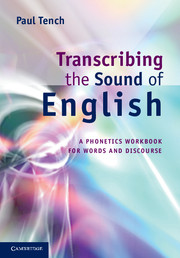3 - Word Stress
from Part I - Words . . .
Published online by Cambridge University Press: 05 June 2012
Summary
The pronunciation of a word consists of at least one syllable; if a word in English consists of more than one syllable, one syllable will sound more prominent than any other. That greater prominence is what is called stress, and we have already introduced the IPA symbol for it [ ' ]. The earliest examples we introduced included snippet
/'snɪpɪt/with the stress on the first syllable, and exist
/εɡ'zɪst, ɪɡ'zɪst/with the stress on the second syllable.Stressed syllables contain any of the strong vowels; unstressed syllables contain a weak vowel, and also /ɪ/ or /ʊ/ if at most one consonant follows as in deceive and educate
/dɪ'siːᴠ/, /'εdjʊkeɪt/However, there is an intermediate degree of stress that occurs in many English words. Take the word pronunciation itself; it has five syllables:
/prə.nΛn.si.eɪ.ʃən/The fourth syllable /.eɪ./ has the greatest degree of prominence and so will be marked as stressed: /prənΛnsi'eɪʃən/. The first, third and fifth syllables all contain weak vowels, but the remaining one, the second, has the strong vowel /Λ/, and sounds too strong to be unstressed, but not strong enough to be the stressed syllable. Hence we make a distinction between the primary stress /.eɪ./ and a secondary stress /.nΛn./, which is nevertheless heard to be more prominent than non-stress, i.e. unstressed syllables. The IPA symbol for secondary stress is a stress mark at the foot of the following syllable: /prəˌnΛnsi'eɪʃən/.The identification of secondary stress is important in three types of word: long words which have any number of syllables before the primary stress, a number of homographs, and compound words.
- Type
- Chapter
- Information
- Transcribing the Sound of EnglishA Phonetics Workbook for Words and Discourse, pp. 56 - 59Publisher: Cambridge University PressPrint publication year: 2011



